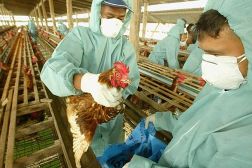 The United Nations has warned of a possible major resurgence of the deadly bird flu virus and the spread of a mutant strain in Asia and elsewhere.
The United Nations has warned of a possible major resurgence of the deadly bird flu virus and the spread of a mutant strain in Asia and elsewhere.
The UN’s Food and Agriculture Organisation (FAO) says authorities need to undertake increased surveillance and be on the alert for a potential outbreak of the H5N1 virus.
But it says that at present there is no cause for alarm.
The virus has remained entrenched in Bangladesh, China, Egypt, India, Indonesia and Vietnam, and the UN is concerned it could spread to Cambodia, Thailand and Malaysia, as well as the Korean peninsula and Japan.
It said recently affected areas included Israel, the Palestinian Territories, Bulgaria, Romania, Nepal and Mongolia.
FAO senior animal health officer Jan Slingenbergh says the virus is going strong in chicken-to-chicken transmission, but wild birds are also a carrier, with the capability of spreading the virus further than domestic birds.
“We are moving into fall [autumn] in the northern hemisphere and because of that we expect an increased flare up mainly because of migratory bird-affected viruses in the areas stretching from eastern Asia all the way to Siberia and the Arabian Peninsula and perhaps the Black Sea basin,” he said.
The latest human death occurred earlier this month in Cambodia, which has registered eight cases of human infection this year, all of them fatal, the agency added.
The UN says H5N1 has infected 565 people since it first appeared in 2003, killing 331 of them.
The virus was eliminated from most of the 63 countries infected at its peak in 2006 after mass poultry culling, but since 2008 it has been spreading in both poultry and wild birds, the FAO said.
“The general departure from the progressive decline observed in 2004-2008 could mean that there will be a flare-up of H5N1 this fall and winter,” FAO chief veterinary officer Juan Lubroth said.
He said the appearance of a variant strain of the virus in China and Vietnam was a concern, because it appeared to be able to sidestep the defences of existing vaccines.
“Wild birds may introduce the virus, but people’s actions in poultry production and marketing spread it,” Dr Lubroth said.
“Preparedness and surveillance remain essential … no-one can let their guard down with H5N1.”
But at this stage Mr Slingenbergh says public health authorities do not need to be unduly concerned that new forms of the virus are about to start spilling over into humans.
The Federal Health Department was unavailable for comment


